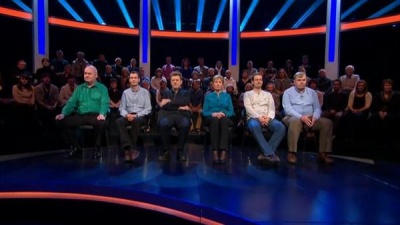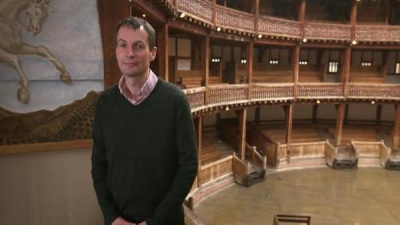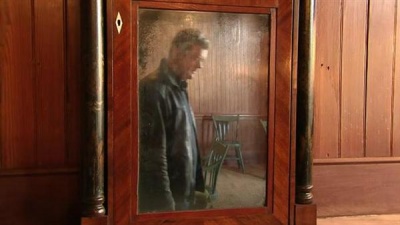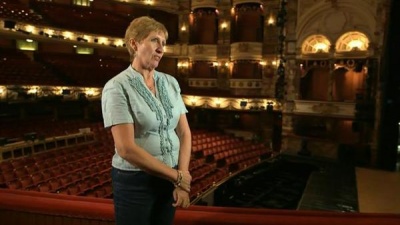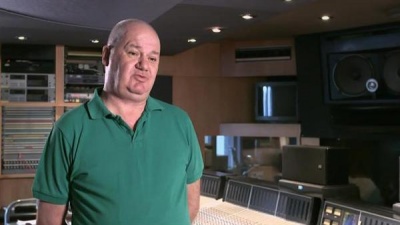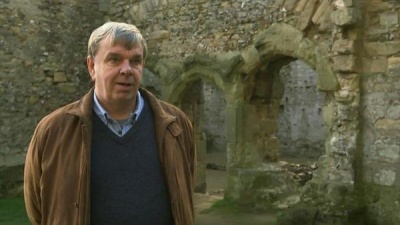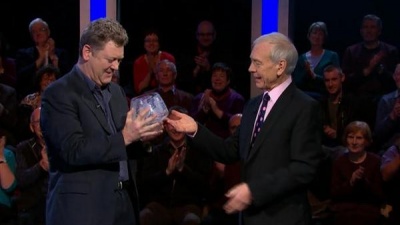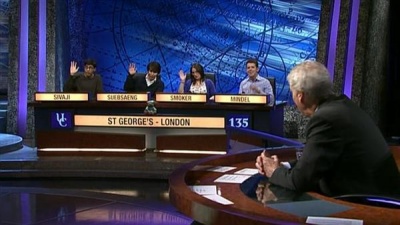Weaver's Week 2013-04-07
Last week | Weaver's Week Index | Next week
Contents |
Mastermind
The 2013 final
John Savage is our first finalist, taking UK chart music of the 1970s. The decade began with The Beatles still together; it ended with the release of "Rapper's delight". ABBA was massive internationally, Slade were big in Britain, and Jimmy Osmond was little. As we've been seeing on Top of the Pops reruns, the decade had some moments of artistic genius (The Vibrators), some moments of cringe ("No charge"), and some that leave us speechless (Legs and Co's routine to "Mah nah mah nah").
As is traditional, the contenders have been allowed to leave the television studio to make a short film. Mr. Savage has swapped for the SARM recording studio, where the likes of Bowie, Marley, and The Roxy Music recorded their works. He tells us that his application was a spur-of-the-moment decision one lunchtime, and we get the impression that making the final is an achievement in itself. The contender has the one tactic: don't pass. It means he has a bit of a shaky start (as opposed to a Shakey start), but soon finds his groove. Enough bad record puns! The round finishes on no passes and 9 points.
Paul Whittaker will tell us about Shakespeare's Wars of the Roses plays. The first four plays – Henry VI parts 1 to 3, Richard III – were written early in Shakespeare's career, and adopt a simple tone: the godly tend to be right, and attackers are morally and physically deficient. His later works – Richard II, Henry IV parts 1 and 2, Henry V – are more nuanced, and hew more closely to the Elizabethan court's idea that rebellion is never right.
For his film, Mr. Whittaker has come to the Globe theatre; on the day of filming, it's more like the Globe swimming pool thanks to the British autumn. We reckon this is a perfect Mastermind topic: large enough to be challenging, small enough to be manageable. When filling out his application form, Mr. Whittaker reckoned that adding a Shakespeare play would make him look more intellectual; preparations include a good jog and a blueberry smoothie. It seems to have worked: the contender takes question after question. There's one error part-way through the round, but he's come out with 14 (0). The challenge is thrown down.
Aidan McQuade will tell us about Abraham Lincoln (1809-65). Born in Kentucky, Lincoln was moved to Indiana aged seven, and proved to be a better scholar than he was a farm labourer. He moved to Illinois, secured election to the state legislature, qualified as a lawyer, and rose through Congress. His debates against Stephen Douglas in 1858 attracted huge crowds, and secured his name amongst the public, but failed to secure his election to the Senate. Lincoln was elected president in 1860, at which point pro-slavery states withdrew from the union, precipitating a conflict with the federal government. As a war tactic, Lincoln ended slavery in territories under his control; the battles ended in April 1865, shortly after Lincoln's re-election. Five days after the south's surrender, Lincoln was assassinated.
Another "spur-of-the-moment" applicant, Mr. McQuade has drawn the long straw, and gets to visit Abe's retreat in Washington. "It takes as long to think as it does to panic," he tells us, sure that the winner – whoever they are – will be a worthy one. The questions remind us of the Gettysburg Address, the Hampton Roads, advisor Seward (himself responsible for a remarkable folly), and his various vice-presidents. A couple of errors cause the contender to visibly wince, and he finishes on 11 (1).
Sian West is taking the Operas of Verdi (1813-1901). Best known for works like Rigoletto, La Traviata, and Aida, Verdi's signature style was to use existing dramatic works, especially historical dramas. He's known for memorable tunes, show-stopping songs, and for strong characters. Often writing for a specific building, Verdi would supervise the rehearsals and amend the score.
Perhaps drawing the short straw on the film trip, Sian is travelled all the way to the Coliseum in London, where she goes backstage and treads the fabled boards. In her life, she's been a prison governor and has learned to manage her adrenalin rushes. She's the first contender to tempt fate with the words "if I won..." Whether correct or wrong, she answers swiftly and crisply, perhaps hoping to squeeze in an extra question. Verdi wrote about two dozen operatic works, making this a somewhat larger topic than Mr. Whittaker's, but far smaller than Mr. Savage. The round seems to dwell on the background to the operas rather than the works themselves, and she finishes on 6 (1).
Didier Bruyere takes the Paris Commune of 1871. For two months that spring, Paris was the home to a remarkable government. A war with Prussia had been lost, the national government had decamped to Bordeaux, and after a four-month siege the Germans had marched into Paris. The Parisians were spitting nails, and elections produced a city government of republicans, socialists, and Jacobins who thought that Robespierre had been a bit soft. These unlikely bedfellows worked for a secular, social democratic city, granting pensions, abolishing night work for bakers, advancing feminism, and making schools operate free of charge. All of this was done against the policies of the national government, which had deigned to return to Versailles, and sent troops to rid the city of this democratic experiment. The troops loyal to Versailles marched through the city in late May, killing anyone they thought had supported the commune. In later years, the event would be praised by revolutionary socialists like Marx, Engels, Lenin and Mao; such opinions mean it's frowned upon by more right-wing historians.
So, for a round set in Paris, M. Bruyere has taken the train to the Bibliotheque du Paris in France. It's clear that French is his first language, and we salute anyone who can answer complex questions in a second tongue. Under questioning, it feels like nerves give a slightly rocky start, but the contender quickly finds his feet, and finishes on 11 (0). Good confidence for the next stage.
Andrew Frazer has the Roman Empire 284-476 AD. The late empire begins with the rise of Diocletian, who realised that the whole of Europe was too large for one person to rule, so he split it into eastern and western sides. The upstart Christian religion was legalised by Constantine, and then invasions began. Vandals, Barbarians, Goths, Allemannii, Visigoths all raided the fringes of the Roman empire. Britain was asked to "organise its own defence" around 410, as the Romans withdrew. The Eastern Roman Empire mutated into the Byzantine Empire, and can trace a lineage to the fall of Constantinople in 1453.
For his film, Mr. Frazer has come to Portchester, one of the best-preserved Roman forts in northern Europe. He's been prepped by his wife, who has been testing him on his weak general knowledge subjects. A regular quiz league player, he tells us that quizzing is his serious hobby, and reminds us that he's got all the specialist questions right so far. That's tempting fate rather; so is the choice of what feels like a very large subject. But it's clear that the contender is up to the challenge he's set himself; there's one slip-up, enough of a delay to not squeeze in an extra question, and a score of 13 (0).
Before the final, there's a swift journey through Mastermind history, from which the contributions of Mr. Snow and Mr. Anderson have been elided.
So straight on to the general knowledge round. Sian West knows that she isn't going to win, begins her general knowledge round with a good head of steam, and finishes on 15 (3).
We'd be surprised if John Savage is in contention for the final, but then he came from fifth to win the last round. And it's the same this week, nailing the transportation of Cleopatra's Needle, the alcoholic drink Merlot, and the composition of bell metal. Unlike previous rounds, he's missing quite a few questions this week, and closes on 20 (0).
Aidan McQuade scores with the Mona Lisa, the career of Chris Patten, and how to make a strüdel. The correct answers keep on coming: Pan being half man half goat, the actor Edward Robinson, the invention of the "dwarf planet", and Churchill's prize for literature. Throughout the contest, this contender has spent all his energy on consideration and reflection, answering in a quiet, monotonous voice. It serves him well: the final is 25 (4).
Didier Bruyere now knows he'll need to do well to win the game. Death Valley and Bram Stoker get him off to a start, as does the Mars probe Curiosity. It's clear that his tactic is to answer questions rather than take a pass: neither of the leaders has passed so far, and he doesn't care to fall behind. We never get the impression that he's entirely comfortable with these questions, and after taking a pass two-thirds through, the final score is 23 (2).
Andrew Frazer needs to double his score to take a clear lead, and after the easy questions at the start of the round, it begins to look like he's not going to score well. The points appear in dribs and drabs, there's no tidal wave of scoring as he rode in the opening round. Still, scoring on about half the questions and moving quickly means he does keep the board ticking over, finishing on 22 (0). When the buzzer goes, he knows he's not done enough.
Paul Whittaker needs eleven to win, twelve if he passes an awful lot. "Moon River" and Mount Fuji are the first two, but then he confuses Micawber's definition of happiness and misery. The answers keep appearing: the Braemar games, Pavlov's dogs, Cleo Laine. He knows he can afford to run up a few passes, but only a few, and suddenly the torrent of points turns into a trickle, and finishes on 23 (3).
So Aidan McQuade, a charity director, is this year's Mastermind champion. We don't think he can quite believe it. "What will you do with the trophy?" asks Humpo. "Keep bananas in it," the laconic response. It's a low-key presentation, just handing over the bowl and moving to the closing credits. Well done to him, well done to the other finalists, and the hunt for the 2014 Mastermind begins later in the year.
University Challenge
Group phase, match 9: Manchester v St George's London
"There are four places in the semi-final of this tournament," says the host, perhaps pointing out a flaw. Would we be better off having 24 teams going down to 12 and 6, and then a near-complete round robin to determine the finalists? Probably not. Both Manchester and St George's won three matches, lost their fourth, and need to win their fifth to book a place in the final four.
St George's have the night's first starter, knowing that George V took to the throne in 1910. Manchester was first to the buzzers there, as they are on the next three starters. When St George's buzzes first, their reward is a five-point penalty. By the first visual round – maps of the Ivy League – Manchester's lead is an impressive 75-5. Less impressive work from the graphic designers, using green and red symbols without any other distinction. As we noted last week, this is a distinction without a visible difference for a significant minority of the population.
The theory and practice of socialism gives points to Manchester, but St George's get back on with the official name of the tilting trains used on the west coast line. The unofficial name is a bit Dick 'n' Dom. Words formed from "doggerel", sciences of work, and geometric transformations bring the London side back into the game, they trail 65-95 at the audio round, pieces from the Mighty Handful of Russian composers, to which Manchester brings the tactic, "when in doubt, say Rimski-Korsakov".
The chemical formulation of quartz, the works of Harold Pinter, and then we're up to Connect Three, photos of women who have won Nobel prizes. Manchester's lead is pulling out a bit further, 140-90. Does University Challenge count the Economics prize as a Nobel one? Evidently so. Does University Challenge want to nick questions from Only Connect, asking its competitors to complete a sequence of locations of Disney parks? Evidently so: we recommend that the 2014 teams here swot up on questions Victoria asked in 2010.
Manchester go on to prove their knowledge of stations on the Brussels métro, St George's pull back a little, but with time running down, surely they're not going to get back? Not with Manchester getting a starter and some bonuses, and not when dwelling forever on Latin names for birds. At the end of the show, Manchester's winning score is a handsome 220-135. Everyone on Manchester got a starter.
Next match: Bangor v King's Cambridge
Countdown Update
After the heroics of the Second Supreme Championship earlier in the year, normal Countdown service resumed at the beginning of March. Rachael Moran was the carry-over champion, she added a fourth win to her total, and could be dangerous if she makes the Finals Week. Philip Jarvis unseated the champion, recording two wins. Sam McElhinney ground out four wins, we would be surprised if he were to make progress in the last eight.
Andy Platt has surely booked his place in that tournament: he won eight games He won eight games with century scores, including five super-century scores of over 110. Since then, Peter Fenton won two games, Jean White won one, and Giles Hutchings scored 129 in his one win so far, the highest ever score from someone on their debut.
During Andy's run, Countdown had the biggest format change in over ten years. The root cause was that Channel 4 wanted to move the 3pm ad break forward, so that it was closer to 2.55. At Channel 4 Towers, the importance is that when BBC1 viewers switch over on the hour, they have the familiarity of Countdown and not some unappealing commercials. For Countdown aficionados, the change is to resolve one of those little irritants: introduce a fourth numbers round, and reduce the challenger's large advantage in picking the last two numbers games.
For the viewer, there are other benefits: the celebrity anecdote moves from the end of part one to half-way through part two. It's more difficult to skip over, and helps to break up the middle section of play – four letters rounds can be a featureless desert, now there's a numbers game and a funny story in the middle. Susie Dent's educational feature has also moved, it now splits a run of four letters rounds in the final period of play.
Statisticians will note that the theoretical maximum score has reduced by 8 points, replacing a letters with a numbers. We think that the general maximum will increase by about 3 points: the average letters selection is worth a little less than 7 points, the average numbers round is worth a little less than 10. Our gut feeling is that numbers games are easier to hit than letters, so we suspect that it will be a little easier to achieve near-perfect games. In two of his matches, the very good Andy Platt scored maxima in 13 rounds, including all the numbers. Will there be a Perfect Game most years now? Given the standards of play, it's quite possible.
More nine-letter fun in early May.
This Week And Next
Here's a novelty: Brian Dowling has been evicted from Big Brother. The 2001 and Ultimate series winner turned host when Channel 5 bought up the programme, but not any longer. Emma Willis takes over the live programme, stepping up from spin-off programme Little Brother. Reports that her replacement on BBLB will be a sheep made out of a toilet roll covered in cotton wool have not been denied by the Channel 5 press office, mostly because we've not asked them.
Another commentator asked if there should be revivals of The Crystal Maze and/or Supermarket Sweep. To take the latter first: no, we tried it some years ago, and it bombed. We reckon there is room for a Crystal Maze-style show, but the original is so closely identified with Richard O'Brien that no-one else could possibly host it. The closest we might get is a B-list Celebrity Fort Boyard with Laura and Andy.
Speaking of B-list celebrities, congratulations to Ant and Dec, whose seminal 1994 single "Let's get ready to rhumble" reached number one last weekend. Now that the novelty's worn off, we expect the tune to plummet down the charts as though it was falling off a high board. At least it's more watchable than Splash!.
BARB ratings for the week to 24 March, when Saturday Night Takeaway had 7.25m watching Ant and Dec wreck the mike, psyche. Best score of the year, there. Who Dares Wins pulled in 5.55m, Masterchef on Wednesday 5.35m, Pointless Celebrities Dr Who 5m, and The Cube took 4.7m viewers, its best score of the series. Missing in action is Food Glorious Food, which we'll be reviewing next week. University Challenge had 2.9m viewers, Great British Menu moved towards its final with 2.2m, and 8 Out of 10 Cats topped Channel 4's lists with 1.75m. There were 2.06m viewers for Celebrity Juice, 575,000 for Come Dine on More4, and 315,000 for Masterchef India on Star Plus.
Coming up: Catchphrase (ITV, 6.45 Sunday) is now hosted by Stephen Mulhern. There's a new run of Put Your Menu Where Your Mouth Is (BBC1, 3.45 weekdays), Robot Combat League (Sci-Fi Channel, 8pm Thursday), and the first of two 8 Out of 10 Cats Does Countdown specials (C4, 9pm Friday). Next Saturday's talent shows: BBC The Voice of Holland of UK (BBC1, 6.45), a new run of Britain's Got Talent (ITV, 7pm), and re-runs of Bob's Full House (Challenge, 7pm). And that's The Unbelievable Truth (Radio 4, 6.30 Monday).
The picture of a cardboard tube sheep is cc:by-nc-nd by cheerytomato
To have Weaver's Week emailed to you on publication day, receive our exclusive TV roundup of the game shows in the week ahead, and chat to other ukgameshows.com readers, sign up to our Yahoo! Group.

